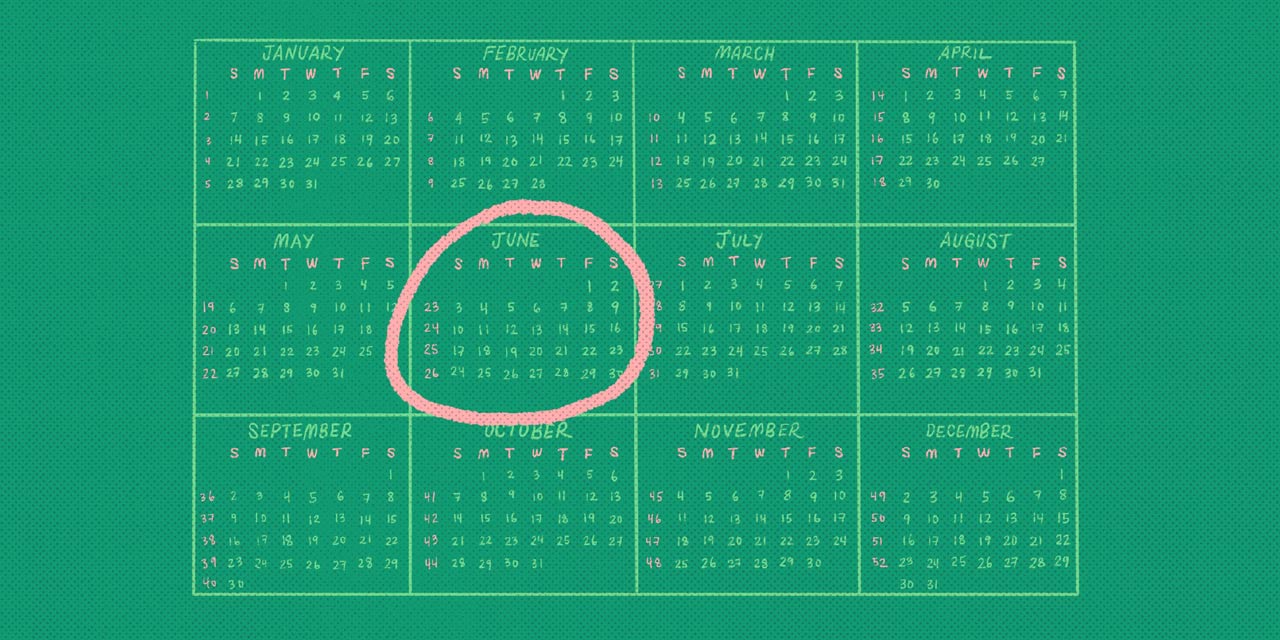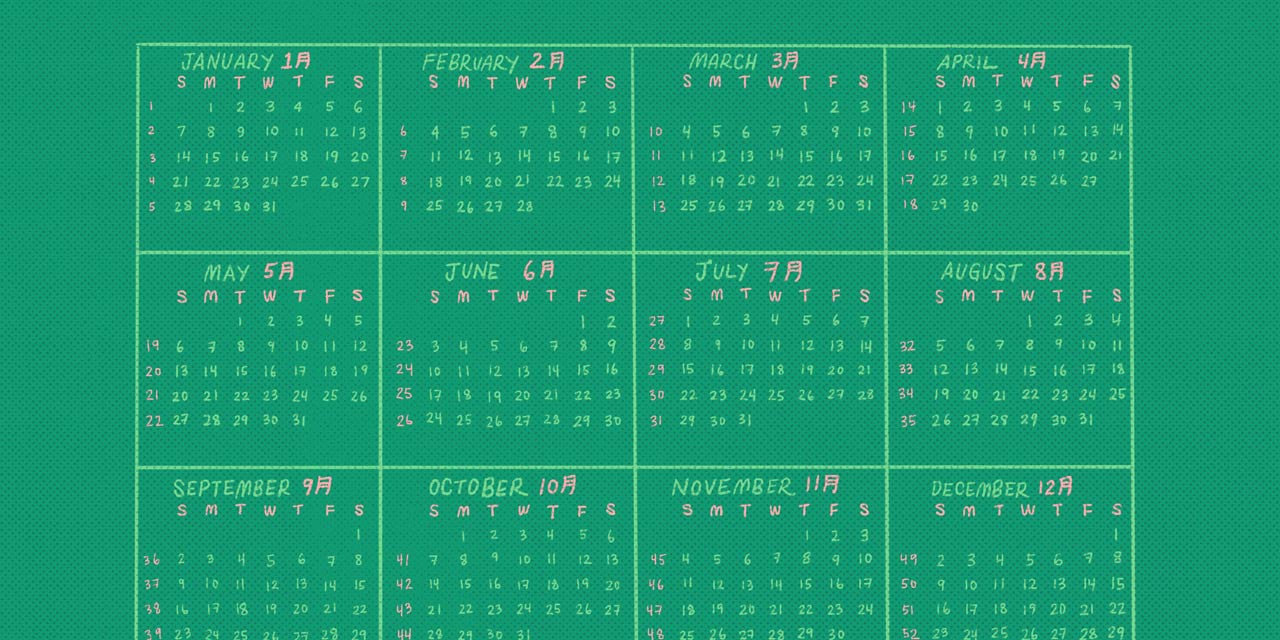With all these various readings, changes, and combinations, it's important to learn how and when to use 月 correctly.
The kanji 月 is a complex one: it means both "moon" and "month," it's the Japanese counter 月 (つき) that counts the number of months, and 月 also means "calendar months in order." Why all these meanings? Remember that Japan originally used the lunar calendar, so 月 has many connections to months and to the moon.
And there's more: when used for counting, 月 changes from つき to げつ or がつ and can frequently combine with the counter 個 (こ) to become 箇月 (かげつ).
With all these various readings, changes, and combinations, it's important to learn how and when to use 月 correctly. We're here to help!
- How to Use the Japanese Counter 月 (つき)
- How to Use the Japanese Counter 箇月 (かげつ)
- How to Use the Japanese Counter 月 (がつ)
- Goodnight Moon
How to Use the Japanese Counter 月 (つき)

Let's begin by looking at 月 as it's used to count months. Context is everything: when the reading is the wago reading つき, the numbers that accompany it use wago as well. This makes it clear whether you're counting months or simply naming a specific calendar month. Without this distinction, it's hard to know if 五月 means "five months" or "the month of May."
| Numeral | Japanese | Reading 1 | |
|---|---|---|---|
| 1 | 一月 | ひとつき | |
| 2 | 二月 | ふたつき | |
| 3 | 三月 | みつき | |
| 4 | 四月 | よつき | |
| 5 | 五月 | いつつき | |
| 6 | 六月 | むつき | |
| 7 | 七月 | ななつき | |
| 8 | 八月 | やつき | |
| 9 | 九月 | ここのつき | |
| 10 | 十月 | とつき | |
| How many | 何月 | なんつき |
While you can see the numbers one to ten here, it's usually only common to use 〜月 when referring to one or two months. For three or more, you use the counter 箇月, explained below.
- ひと月もお風呂に入っていない。
- I haven't taken a bath in a month.
- 二月後には返事をします。
- I'll give you an answer two months from now.
When referring to three or more months, 箇月 is more common—except in a specific idiom for a full-term pregnancy: 十月十日 (とつきとおか).
- 「十月十日」と言われるように、妊娠期間は約10カ月間あります。
- Like the phrase "ten months and ten days" says, pregnancy generally takes about ten months.
How to Use the Japanese Counter 箇月 (かげつ)
The kanji 箇 is an older version of 個, the counter for almost everything.
As we mentioned earlier, 月 isn't the only counter to count months. 箇月 is used as well, and it's more common than 月 alone—especially when counting three or more months.
The kanji 箇 is an older version of 個, the counter for almost everything. Because it's so old, it's usually written with the hiragana か, the katakana カ, or its smaller version ヵ. It's also common to see it written as the katakana ケ or its smaller version ヶ, though when you see this, it's still read か, not け!
🤯
Simply put, there are many different ways to write 箇, but it's always pronounced か.
| Numeral | Japanese | Reading 1 | |
|---|---|---|---|
| 1 | 一箇月 | いっかげつ | |
| 2 | 二箇月 | にかげつ | |
| 3 | 三箇月 | さんかげつ | |
| 4 | 四箇月 | よんかげつ | |
| 5 | 五箇月 | ごかげつ | |
| 6 | 六箇月 | ろっかげつ | |
| 7 | 七箇月 | ななかげつ | |
| 8 | 八箇月 | はちかげつ/はっかげつ | |
| 9 | 九箇月 | きゅうかげつ | |
| 10 | 十箇月 | じゅっかげつ (じっかげつ) | |
| 11 | 十一箇月 | じゅういっかげつ | |
| 12 | 十二箇月 | じゅうにかげつ | |
| 100 | 百箇月 | ひゃっかげつ | |
| 1,000 | 千箇月 | せんかげつ | |
| 10,000 | 一万箇月 | いちまんかげつ | |
| How many months | 何箇月 | なんかげつ |
Because 箇月 has a "k-" sound, the number's pronunciation changes. Remember that you can always check out our Japanese Counters guide for a big-picture explanation on how these readings change.
- 1カ月ほど前にトーフグのコウイチを見ました。
- I saw Koichi from Tofugu about a month ago.
- 2か月後に日本に行きます。
- I'm going to Japan in two months.
- ワニカニで三ヵ月間漢字を勉強しました。
- I studied kanji on WaniKani for three months.
- 4ケ月ぶりに髪を切った。
- It's been four months since the last time I got my hair cut.
- 五箇月で日本語をマスターした。
- I mastered Japanese in five months.
- フラフープを毎朝6ヶ月続けたらやせました。
- I hula-hooped every morning for six months straight and lost weight.
How to Use the Japanese Counter 月 (がつ)

Finally, 月 is used when counting calendar months—January through December.
Calendar months aren't numbers you count. Instead, they're numbers listed in order with a special ordinal suffix 月 (がつ). Their readings are pretty straightforward:
| Numeral | Japanese | Reading 1 | English | |
|---|---|---|---|---|
| 1 | 一月 | いちがつ | January | |
| 2 | 二月 | にがつ | February | |
| 3 | 三月 | さんがつ | March | |
| 4 | 四月 | しがつ | April | |
| 5 | 五月 | ごがつ | May | |
| 6 | 六月 | ろくがつ | June | |
| 7 | 七月 | しちがつ (なながつ) | July | |
| 8 | 八月 | はちがつ | August | |
| 9 | 九月 | くがつ | September | |
| 10 | 十月 | じゅうがつ | October | |
| 11 | 十一月 | じゅういちがつ | November | |
| 12 | 十二月 | じゅうにがつ | December | |
| Which month | 何月 | なんがつ | Which months? |
Finally, 月 is used when counting calendar months—January through December.
月 (がつ) has a "g-" sound, so the pronunciation of the numbers shouldn't change. Still, you'll need to watch out for a few odd readings. When counting numbers, "four" is usually read よん, "seven" is read なな, and "nine" is read きゅう. However, 四月 (April) is read しがつ, 七月 (July) is read しちがつ, and 九月 (September) is read くがつ.
You can technically read 七月 (July) as なながつ, though it's unusual and really only exists to make sure you aren't confusing it with 一月 (いちがつ, January).
- 一月と二月は每日雪でした。
- It was snowing every day during January and February.
- 三月にワニカニを始めました。
- I started WaniKani in March.
- 四月から大学生です。
- I'll be a university student in April.
- 五月から八月まで日本に行ってます。
- I'll be in Japan from May to August.
- 6月の試験まで、六ヶ月間必死に勉強した。
- I studied hard for six months until the exam in June.
- 7月まであとひと月もありませんよ。
- There's less than one month left until July.
- 九月二十九日の三ヵ月後は、十二月二十九日ですよね?
- It's three months from September 29th to December 29th, right?
- 十月からふた月、ハワイに行ってきます。
- I'll go to Hawaii in October for two months.
- 11月11日に11歳になりました。
- I turned eleven on November 11th.
Goodnight Moon
Have you had enough moons and months for now? Is all this making you crave a swim in the river reflecting the 月 (moon), beneath the bridge? Is it inspiring you to create a haiku?
Moon in a black sky
Counters are tiring my eyes
Under an old bridge
Let's hear yours!
Okay, it's time for a well-deserved break. Make sure to come back soon though, because we have this, this, this, and this counter for you to master. And it won't take many 月s either!
And if you're new to this whole counters deal, we recommend you learn the basics of Japanese counters, and then scroll through our massive study list of Japanese counters, which can take you to all the counters articles we've written about in-depth.
